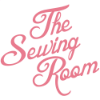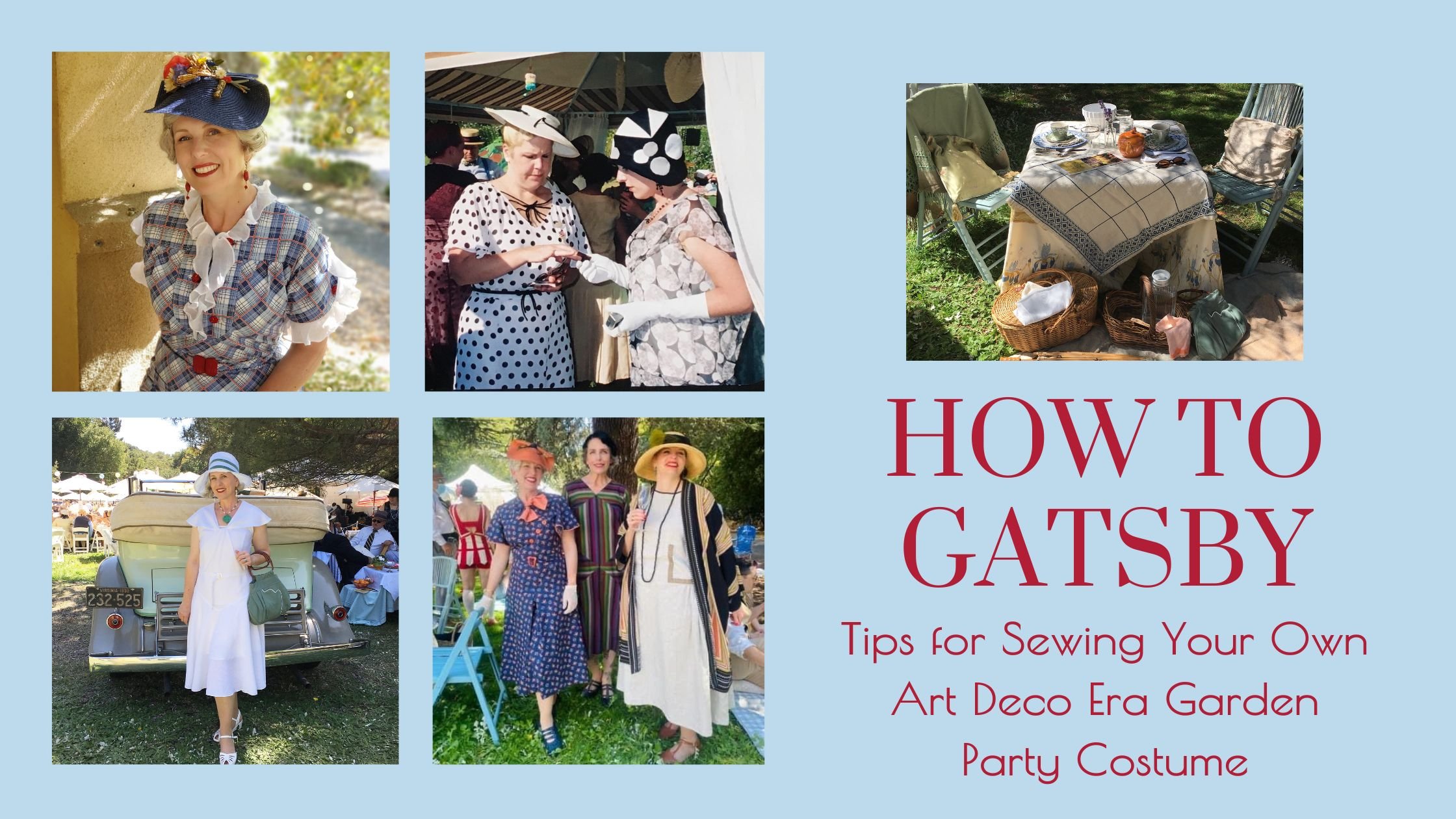For myself, one of the most fun parts of getting ready for The ADSC Gatsby Summer Afternoon is making my outfit. It truly brings me so much joy to plan what I’m wearing from my hat and hair down to my stockings and shoes. Sometimes I have more time than other times to figure it out, so depending on my schedule I can make the experience as simple or as complex as I can handle at the time.
This event takes place in the daytime on a rolling lawn in front of a very grand home in the hills of Oakland, on the Dunsmuir Hellman Historic Estate. It’s always the 2nd Sunday in September from 1-6pm and the weather is usually quite warm. The event is an afternoon garden party. Most people choose light airy Summer daywear styles typically worn in the art deco period (1919-1941). It is NOT an evening event so evening wear is discouraged. Some people like to come in themed clothing. I’ve seen beachwear, military, nurses, maids and even the occasional aviatrix. It’s fun to dress up and make a day out of this wonderful event.
Below are my tips and considerations for sewing your own Art Deco Era Garden Party Dress.
My Mom and I at a Gatsby from the mid 2000’s. I am wearing a dress made from a vintage silk table cloth. My Mom is wearing a dress she made from a Vintage Pattern Lending Library Pattern.
My Friend Dotty (left) is wearing a “One Hour Dress” she made from a vintage table cloth. Go Dottie!
Skill Level and Choosing your Pattern
Are you a beginner, intermediate sewer or advanced stitcher? This is a very important consideration when creating your garment.
For beginning stitchers I recommend The One Hour Dress. The One Hour Dress is a bit of a misnomer because no dress really only takes 1 hour to make. It is a simple garment however and can be made quite easily. There are lots of diagrams for similar dresses on Pinterest. and you can buy the “One Hour Dress” booklets by Mary Brookes Picken.
If you are familiar with and prefer to use a printed pattern there are a few online shops that offer reproduction patterns with multiple sizes and detailed instructions. My favorite of these are:
Wearing History & Decades of style
For Intermediate to advanced stitchers who are able to make fit and sizing corrections, there are multiple options available , in the reproduction vintage pattern market. My favorite shops for these patterns would be:
Vintage Pattern Lending Library, Lady Marlow Patterns, My Vintage Wish Patterns and Jem Vintage Patterns
We also carry lots of Vintage Patterns in our Etsy Shop, including patterns from the 30’s and 40’s.
Jess & I both wearing 1930’s era dresses we made for Gatsby that year.
Tanya and & Both Wearing 1930’s Era dresses we made for Gatsby that year.
Picking your Era within the Art Deco Period
Fashion evolved quite a bit between 1919 and 1941 and you may have a favorite era within that time period. Personally, I love the over-the-top sleeves and bows of the 1930’s, now. But that wasn’t what first drew me in. My first love was the loose, carefree flapper styles of the 20’s. I still like both, but as my body evolved over time, I found the silhouettes of the 30’s more flattering on my figure and the asymmetric seam lines more challenging (in a good way) to sew.
Myself wearing a silk chiffon dress and my friend Dolin who is also wearing a gown she made from a Folkwear Pattern. I believe she also made her Jewelry
Myself (left and my friend) Grace both wearing silk chiffon dresses I made for our First Gatsby Summer Afternoon.
Choosing your fabric
This step is highly important. first off, natural fibers are going to be the best. They didn’t use synthetic fabrics at the time, accept for Rayon, which is actually a processed natural fiber. Not to mention, that natural fibers are inherently easier to sew with. Here are some pros and cons about different fibers to work with:
Cotton - The easiest by far to sew with and works really well for the era. Cotton is very breathable and performs well under hot conditions but it can crease and wrinkle as most natural fibers do. Do be aware of drape and weight however, because some if not most of the styles in this era lend themselves to softer, less structured fabrics. My cotton favorite fabrics to work with are Voile & Lawn.
Linen - An excellent choice for a myriad of styles. I love LINEN!!! It’s beautiful to work with and was used in this time period quite a bit, so it feels quite authentic. The downside, is that it wrinkles quite easily so if that bothers you, it might not be your first choice.
Silk - Silk is very luxurious and was used quite often in it’s lightest forms like chiffon and light crepes. Silk does tend to be the most insulating of fibers however and can be very hot to wear in the summer months. Chiffons are absolutely gorgeous and flow beautifully with the flowy styles of the times.
Rayon - Rayon is a lovely fabric with beautiful drape and tends to feel very cool on the skin. It was used in the later part of the 1930’s and into the 40’s so is also a good choice.
The fabric I used on my dress is from Telalinda and Jone’s dress is a “One Hour Dress” made from a natural Linen.
Prints Vs. Solids
Prints in the Art Deco style can be hard to find. Do a little research of what was popular in the Era before you choose a print. Doing a deep dive into Pinterest can lead to amazing resources and inspiration. If don’t have time for that, go directly to Telalinda! She has amazing fabrics in vintage reproduction prints and coordinating solids that work great for the Gatsby picnic. Stripes and Dots are always a good choice too.
Notice the stripes on my friend Julie’s dress (pictured in the center between myself and Jone). She’s changed the direction on her stripes to create an interesting effect. This type of stripe work was popular during the 1920’s and 1930’s and makes her dress very appealing and era correct.
Purchasing Fabric and Trims
Finding the right fabrics for you dress can be difficult. Some of my favorite resources for fabric are:
Britex Fabrics in San Francisco - Lovely natural fiber fabrics and printed silk chiffons as well as cotton voiles
Stone Mountain and Daughter in Berkeley - Gorgeous fabric selection and designer ends fabrics
Piedmont Fabrics in Berkeley - Also a lovely selection of fabrics to choose from.
Lacis in Berkley - has the most amazing vintage trims, buttons and millinery supplies and is also a great resource for vintage dresses as well.
Telalinda Fabric - Vintage reproduction cotton and rayon prints
Myself wearing my black and white silk chiffon late 1920’s style dress and a linen hat; both made by me.
My friend Tamara and Myself both wearing black and white. Dots are awesome!
Tips for Sewing
Give yourself enough time to complete your ensemble - Proper planning will make your event day run much more smoothly. I give myself at least two week to make my pieces and often start working on my ensemble early in the Summer so I can work through any technical issues I might have with the fit and to procure the accessories needed to complete my garment.
Make a prototype of your dress - Making up your garment in cotton muslin or another cheap fabric before you cut your actual fashion fabric, will help you with fit issues and construction challenges you may have during the process.
Search for and buy vintage trims - I buy a lot of belt buckles and buttons on Etsy & Ebay that are actually from the 1920’s and 30’s . They are not terribly expensive and add a lot of character to my pieces. I Love using vintage trims.
Accessorizing your Ensemble
Period Correct (or appropriate) Hair and Accessories can really make your look.
Hair - Your hair can be your best accessory, but it might require practice to get the styles right. My friend & Colleague, Julie Ann Brown (aka @miss.silver.starlight) recommends that you style your hair around the hat you are wearing or only style what will be visible with the hat. This will save you a lot of time.
Hats - Whether you choose to make a hat or purchase one, hats often make your ensemble complete. They were De Rigueur for this time in history, as were gloves & matching belts.
Shoes - 1920’s & 1930’s shoe were similar in that they were often a Mary Jane or T-Strap style. You can find many reproduction brands that make shoes from this era - American Duchess, Remix Vintage Shoes & Memery shoes are great! Sometimes they can be quite expensive however and sometimes even uncomfortable if you plan traversing the expansive grounds of the Dunsmuir Estate. For that reason alone, you might want to consider a flatter Mary Jane style. Rockport and Aerosoles often make 20’s and 30’s era “inspired” shoes that are actually comfortable and allow for walking. You may have to do a little searching online. I’ve had luck on both Ebay and Poshmark.
Above are a few photos of my mom wearing Garden Party appropriate. The red & white dress she made from a 1920’s Vintage Pattern Lending Library Dress. The orange and blue print dress was made by @duchessofhutch from Liberty Lawn, using the Decades of Style Baltimore dress pattern.
I hope this post has proved helpful. Would love to know if you are attending this years ADSC Gatsby Summer Afternoon! Let me know in the comments.
Until Next Time, Happy Sewing!
xo Jennifer















